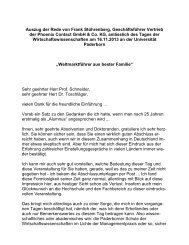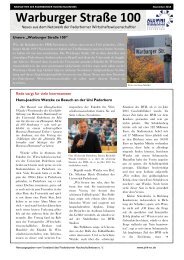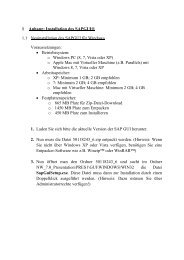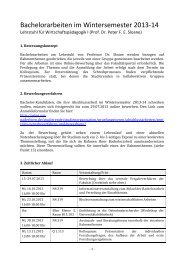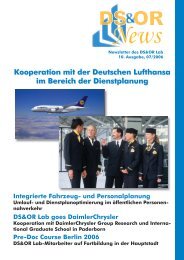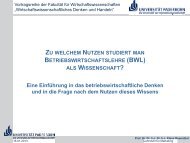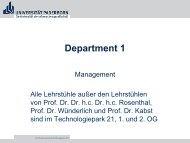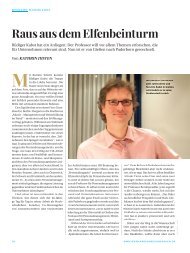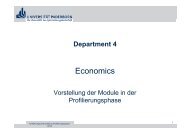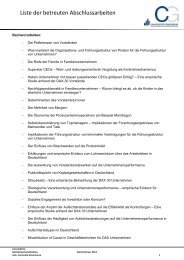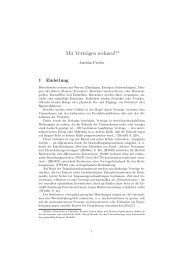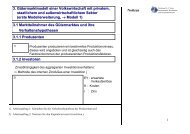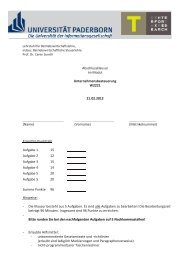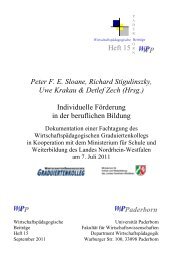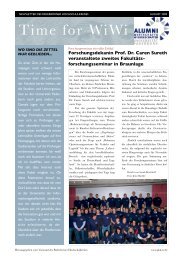Englisch - Fakultät für Wirtschaftswissenschaften - Universität ...
Englisch - Fakultät für Wirtschaftswissenschaften - Universität ...
Englisch - Fakultät für Wirtschaftswissenschaften - Universität ...
Erfolgreiche ePaper selbst erstellen
Machen Sie aus Ihren PDF Publikationen ein blätterbares Flipbook mit unserer einzigartigen Google optimierten e-Paper Software.
Mitglied des wissenschaftlichen Beirats C-LAB<br />
(seit 01/2011)<br />
Jurymitglied UGO-Preis<br />
Mentor <strong>für</strong> BMBF-geförderte Unternehmens -<br />
gründung „maxcluster“<br />
Vorjuror beim interdisziplinären Ideenwett be -<br />
werb GENERATION-D (seit 05/2011)<br />
Aktuelle Forschungsprojekte<br />
Current Research Projects<br />
SOGRO – Sofortrettung bei Großunfall<br />
In Katastrophenfällen sind eine schnelle und<br />
effiziente Erstversorgung der Verletzten sowie<br />
eine koordinierte und zielgerichtete Weiter ver -<br />
sorgung dieser von zentraler Bedeutung <strong>für</strong><br />
eine erfolgreiche Sofortrettung. Im vom Bun -<br />
desministerium <strong>für</strong> Bildung und Forschung<br />
(BMBF) geförderten Forschungsprojekt SOGRO<br />
werden der Einsatz von Informations- und Kom -<br />
munikationstechnologien (IKT) und dessen Aus -<br />
wirkungen auf den Rettungsprozess erforscht.<br />
Auf Basis moderner IKT wird eine durchgängige<br />
Informationskette von der Erfassung, Sichtung<br />
und Versorgung der Verletzten, der Nachver -<br />
folg barkeit von Transportwegen bis hin zur<br />
Klinikaufnahme aufgebaut, um so zu einer effizienteren<br />
Erstversorgung der Verletzten beizutragen.<br />
Der Lehrstuhl führt in diesem Projekt<br />
die ökonomische Begleitforschung durch, dazu<br />
gehören u. a. die ökonomische Bewertung der<br />
erforschten Rettungstechnologien sowie die<br />
Entwicklung tragfähiger Geschäftsmodelle zur<br />
erfolgreichen Markteinführung.<br />
Utilization Levels and Productivity Effects of<br />
Information Technology Investments<br />
Explaining productivity effects of factor inputs<br />
is an important research topic since improving<br />
the general standard of living is highly dependent<br />
on the ability to grow businesses, industries<br />
and economies, thereby increasing output.<br />
While the productivity effects of labor and noninformation<br />
technology capital and their interrelations<br />
in the transformation process to output<br />
have recently become better understood,<br />
researchers still struggle to explain the full productivity<br />
effects of investments in information<br />
technology (IT) capital. Explaining these full<br />
effects is critical because, increasingly, IT enable<br />
innovation, is the foundation for efficient intraand<br />
inter-organizational processes, and determines<br />
how industries conduct business. In the<br />
last twenty years and especially with the advent<br />
of the information age, IS researchers have<br />
made good progress in laying the basis for an<br />
explanatory model that includes IT as a separate<br />
input factor to explain pro ductivity effects<br />
of IT investments by extending standard production<br />
theoretical models using e.g. the Cobb-<br />
Douglas or Translog production functions.<br />
These standard models typically assume complete<br />
or at least constant factor utilization.<br />
Given fluctuations in the utilization of input factors<br />
– especially in severe economic downturns<br />
as we currently observe – and absent the<br />
opportunity to adjust the IT capital input in the<br />
short term, there are numerous measurement<br />
issues that have to be analyzed and dealt with<br />
in order to extend the models and derive more<br />
accurate productivity estimates of IT investments.<br />
Optimal global sourcing of software development<br />
projects<br />
With the main focus on cost reduction in valua-<br />
tion of sourcing alternatives, risk and risk diversification<br />
effects are often inadequately considered<br />
or completely neglected in decisions associated<br />
with global sourcing decisions for software<br />
development projects. This systematically<br />
results in poor decisions. In this project, we<br />
analyze sourcing costs and associated risks as<br />
well as interdependencies among both sites<br />
and projects. The special focus here is on the<br />
identification of correlation effects between<br />
sites. A normative model shall be developed,<br />
based on e.g. modern portfolio theory, and<br />
validated using data from IT services providers.<br />
IT events and their effect on prices and markets<br />
Securities exchanges are becoming increasingly<br />
automated. Over the course of the past years,<br />
most major exchanges have upgraded their<br />
trading infrastructure to accommodate the<br />
increase in algorithmic trading. E.g. about half<br />
of all trades executed on XETRA, the fully electronic<br />
cash market system operated by Deut -<br />
sche Börse, are generated by algorithmic trading<br />
engines. The effects of IS (in terms of infrastructure<br />
or in terms of automated trading on<br />
the market outcome as well as on the development<br />
of the financial markets in general) are so<br />
far not well understood. In this project, using<br />
primarily the event study methodology, IT-driven<br />
events will be analyzed with respect to<br />
their different impacts on financial markets.<br />
At the same time, we address and explore the<br />
methodological challenges associated with<br />
applying the event-study methodology to financial<br />
market data.<br />
Web services platform to analyze mass data<br />
With the dramatic increase in the speed and<br />
availability of computer networks, a significant<br />
proportion of all economic activities is now conducted<br />
electronically. In particular, the field of<br />
financial trading has seen an unprecedented<br />
increase in both the number of participants and<br />
the volume of trades conducted via electronic<br />
markets. As a result, high frequency data has<br />
become increasingly available for historical<br />
analysis by researchers in fields like econometrics,<br />
finance and accounting. Analyzing such<br />
datasets requires – at least – expert domain<br />
knowledge (e.g. in finance and microeconomics),<br />
experience, and IT skills. In addition to<br />
being able to identify suitable data sources and<br />
specify the right search criteria, users must be<br />
able to perform a wide range of analysis functions<br />
(statistical, data mining, language processing)<br />
and present results in a suitable form<br />
(e.g. through visualization or report creation).<br />
Analysis processes cannot be determined in<br />
advance as users tend to perform tasks in a<br />
piecemeal fashion. When the type of analysis<br />
is complex, users spend a lot of effort cleaning,<br />
reading and interpreting the data, converting<br />
datasets from one format to another, copying<br />
some results from one file to another, and<br />
merging datasets with different semantics.<br />
These activities increase analysis time and the<br />
risk of errors. In this project, an environment<br />
will be developed that supports a Service-<br />
Oriented Architecture (SOA), making it possible<br />
to define re-usable and interoperable software<br />
components as web services which can manipulate<br />
the elements of an underlying, eventbased<br />
data model. Such a model allows a<br />
coherent representation of market activities –<br />
particularly high-frequency market and news<br />
data – as events.<br />
<strong>Fakultät</strong> <strong>für</strong> <strong>Wirtschaftswissenschaften</strong><br />
Faculty of Business Administration and Economics<br />
Department 3 – Wirtschaftsinformatik<br />
Department 3 – Business Information Systems<br />
Aktuelle Kooperationen<br />
Current Cooperation Projects<br />
Impact of infrastructural Changes on the Quality<br />
of Securities Prices<br />
Prof. Dr. Christof Weinhardt, Dr. Ryan Riordan,<br />
Institut <strong>für</strong> Informationswirtschaft und Mana -<br />
gement, Karlsruhe Institute of Technology (KIT),<br />
Karlsruhe/Germany<br />
Optimal Sourcing of Software Development<br />
Projects<br />
Prof. Dr. Bernd Heinrich, Dr. Steffen Zimmer mann,<br />
School of Management Information Systems,<br />
University of Innsbruck, Innsbruck/Austria<br />
Webservices for E-Finance Applications<br />
Prof. Fethi Rabhi, University of New South Wales,<br />
Sydney/Australien<br />
IT Productivity<br />
Prof. Barrie Nault, PhD, Department of Manage -<br />
ment Information Systems, University of Calgary,<br />
Calgary/Kanada<br />
Economics of IS<br />
Prof. Mohammad Rahman, PhD, Department of<br />
Management Information Systems, University<br />
of Calgary, Calgary/Kanada<br />
Corporate Valuation and Taxes<br />
Prof. Dr. Markus Diller, University of Passau,<br />
Passau/Germany<br />
Economics of Controls<br />
Prof. Dr. Stefan Sackmann, Martin-Luther-Uni -<br />
versität Halle-Wittenberg, Halle/Germany<br />
Risk Reporting & Risk Management Systems<br />
Bertelsmann AG, Gütersloh/Germany<br />
IT Risk Management & IT Governance<br />
Volks wagen AG, Wolfsburg/Germany<br />
Enterprise Architecture Planning<br />
Senacor Technologies AG, Nuremberg/Germany<br />
IT Projektportfoliomanagement<br />
Deutsche Postbank AG, Bonn/Germany<br />
E-Mobility<br />
C-LAB, Siemens IT Solutions and Services,<br />
Siemens AG, Munich/Germany<br />
<strong>Fakultät</strong>sinterne Kooperationen an der<br />
<strong>Universität</strong> Paderborn:<br />
KPIs for an IT Organization & E-Mobility<br />
Prof. Dr. Leena Suhl, DSOR Lab<br />
E-Clicker<br />
Prof. Dr. Marc Beutner, Lehrstuhl Wirtschafts -<br />
pädagogik II<br />
Gastaufenthalte<br />
Paderborn Academics as Guest<br />
Researchers<br />
Prof. Dr. Dennis Kundisch<br />
University of Calgary, Canada, 03.–20.12.2010,<br />
Joint research project on Utilization Levels and<br />
Productivity Effects of Information Technology<br />
Investments<br />
University of Calgary, Canada, 07.–22.09.2011,<br />
Joint research project on Utilization Levels and<br />
Productivity Effects of Information Technology<br />
Investments<br />
75



